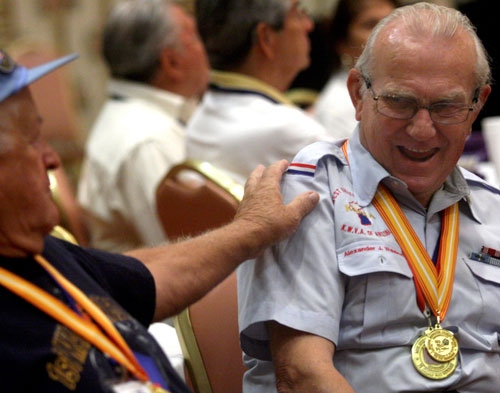Korean War, vets not forgotten
White phosphorus burn scars on his arm and shrapnel scars that extend across his lower leg and thigh remind Marine veteran Ray Moreno of the horrific fight he endured on the Korean peninsula nearly 60 years ago.
The battle for Outpost Harry is what left marks on David W. Mills. He recalled fighting to keep the outpost "at all costs, meaning you prevailed or you die."
Mills spoke Monday at an event to mark the 60th anniversary this month of the beginning of the Korean War. His was one of many accounts shared by veterans who gathered at The Orleans with family members and supporters at a reunion sponsored by Friends of American Veterans of the Korean War and a consortium of South Korean community groups. About 1,000 people attended the event.
Shortly after North Korean communist forces invaded the South on June 25, 1950, Moreno, a flamethrower in the 5th Marines, 1st Battalion weapons company, found himself in the thick of battle.
"They told us we had to hold the Pusan peninsula at all cost," he said. The battle his unit waged began on Aug. 29, 1950, and lasted for eight days.
As Marines took position, "we see the American GIs with their hands tied behind their backs. They had been executed. I saw this helmet on the ground with a picture of a mother and father inside it. That kind of devastated me," he said.
Moreno, 81, of Sun City, Calif., was one of the yellow-legged Marines, so named by the North Korean army because their leggings had become discolored on the battlefield.
"The yellow-legged warriors are very close," he said. "There's only about 1,200 of us left."
Event organizer Steven Kwon said that even though the conflict is called the forgotten war, "we will never forget."
What started as a police action on the 38th parallel mushroomed into a war that lasted three years. The conflict was rooted in the political division of Korea made after Japan, which occupied the nation, was vanquished in World War II. The Allies split Korea, with U.S. troops moving into the southern peninsula and Soviet troops taking position north of the 38th parallel.
The war continued until an armistice agreement was signed on July 27, 1953. An estimated 1.2 million to 1.5 million deaths were reported over three years by a dozen countries involved in the war.
Thirty-four Nevadans are among the 33,742 U.S. military personnel who were killed in action, died of wounds, died while missing, or died while captured, according to Defense Department statistics for the Korean War. There were more than 2,800 non-combat deaths of U.S. military personnel. Of 7,245 prisoners of war, 4,418 were returned; 2,806 died while captured; and 21 refused repatriation.
Mills was among those who were taken prisoner.
Near the end of the war, he was a 17-year-old private in the Army's 3rd Infantry Division, 15th Infantry Regiment, Fox Company. He was captured during the battle for Outpost Harry and was listed as killed in action.
He remembers firing his Browning Automatic Rifle at enemy soldiers who invaded his trench. On April 24, 1953, the outpost was overrun, resulting in 72 casualties among Fox Company's 88 men.
He said he survived "by the grace of God. I was wounded nine times, twice in the head, six times in the leg and once in my left arm."
One enemy soldier stalked him in the trench, which was seven feet deep. "This guy is 15 feet away and I saw the muzzle flash from a submachine gun. He missed and I killed him," said Mills, 74, of Scottsdale, Ariz.
As he scrambled to find another rifle, he was captured.
While on his back, he thought, "David you're gonna die. I said a mental prayer. I said, 'God have mercy on my soul,' and I wondered how my parents were going to take this."
He was taken prisoner and was roughed up by his captors.
"They took me to a cave where I slept next to a wounded Chinese soldier. He died during the night," Mills recalled.
Mills thought he was going to be executed the next morning. Instead, "they put me on a stretcher and carried me for seven days and protected me from the North Korean population," he said.
While being held at Camp No. 6 near Suan, an American fighter jet strafed the compound and dropped a bomb that wiped out the nearby barracks of Chinese soldiers.
After four months as a prisoner of war, Mills was repatriated in a POW exchange on Aug. 24, 1953.
"Not one day goes by that I don't think about Outpost Harry," he said.
This week's appreciation event for Korean War veterans "is absolutely amazing," Mills said.
Mills' story about Outpost Harry is part of a new documentary, "Hold at All Costs," by Dini Films International.
Contact reporter Keith Rogers at krogers@reviewjournal.com or 702-383-0308.
Korean War vets gather to remember 60th anniversary

















